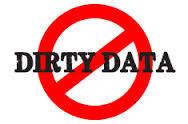Don't Get in the Business of Using Dirty Data
 If your business is using dirty data, then it's time to clean up your act.
If your business is using dirty data, then it's time to clean up your act.
For starters, steering clear of dirty data allows your company to better manage the beneficial data it already has.
Here are just a few negative effects of dirty data and how your company can avoid them:
What is Dirty Data?
Your business might be storing and analyzing data that you don't even know is dirty.
Because of this, it's important to have a working knowledge of dirty data and its effects on your business.
In a digital nutshell, dirty data is any piece of database record that contains one or more errors.
This could be anything from outdated information to incorrect or inaccurate figures. Dirty data also includes data sets that are incomplete or improperly stored.
Businesses of all kinds collect data from their own websites and from their marketing campaigns, which can lead to a lot of dirty data.
The question is how can dirty data negatively affect your business?
Effects of Dirty Data
Dirty data can enter your business's database the same way useful data does.
Unfortunately, it can also quickly interrupt your data management process as well as your business's bottom dollar.
As the article “Is dirty data costing you money?” asks, you need to know the answer.
In many cases it is yes, and it's also wasting your data collection resources and lowering the productivity of your data-based marketing and website analytics. Dirty data can throw off analytical numbers and also make a perfectly good marketing campaign look ineffective.
This is especially critical if your business uses automated marketing features. When dirty data takes hold, it can cripple your customer outreach initiatives making it difficult to reach out to new customers.
Fortunately, there are some steps your business can take to avoid dirty data.
Keeping it Clean: Avoiding Dirty Data
If your business is concerned about dirty data, then you need to actively prevent it from entering your system.
There are a number of ways to do this as well as detect dirty data that is already present:
• Perform a Database Health Check - Your IT department can perform regular database health checks to ensure all data is accurate and error-free. Most health checks can detect data completeness as well as spam traps.
• Create a Data Management System - By creating a framework for ideal data, your business can easily detect data that doesn't meet the minimum standards. Defining how normalized data functions and what your deliverability rates are will keep dirty data from entering the mix.
• Perform Maintenance Regularly - Your business should also perform regular maintenance on all data management practices. This means tracking growth, increases and decreases in deliverability, and monitoring sender scores.
• Avoid Data Duplication - One of the most common forms of dirty data is duplication. Although duplicate data can't harm your system like other forms of dirty data, it can still bog down your data management process. So, have your IT department clear out or merge any duplicate data.
By keeping the dirty data pointers above in mind, you can run a lean, clean business.
Adam Groff is a freelance writer and creator of content. He writes on a variety of topics including personal health and social media.

 Delicious
Delicious Digg
Digg StumbleUpon
StumbleUpon Propeller
Propeller Reddit
Reddit Magnoliacom
Magnoliacom Newsvine
Newsvine
Comments
Post new comment